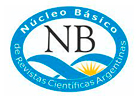FREEDOM, RIGHTS AND STATE OF RIGHT IN THE GLOBALIZATION
Keywords:
Rights, State of Right, globalization, freedomAbstract
This work has for objective to analyze the transformations and implications of the concepts of freedom, rights and the State of Right in the processes of economic globalization.
Downloads
References
Ali, Abbas J. (2001) “In defense of globalization”, Competitiveness Review, Vol. 11, No. 1, i-iii.
Asenjo, J (1984). “La constitución económica española”. Centro de Estudios Constitucionales, Madrid.
Birchfield, Vicki (1999). “Contesting the hegemony of market ideology: Gramsci’s ‘good sense’ and Polanyi´s ‘double movement’. Review of International Political Economy 6:1 Spring 1999: 27-54.
Burgos Silva, Germán (2002). “Estado de Derecho y desarrollo económico: aportes y limitaciones de los análisis neinstitucionales”, Revista Instituciones y Desarrollo No. 12 -13, páginas 193-221. Institut Internacional de Governabilitat de Catalunya, Barcelona.
Campos, N. (1999). Context is everything: measuring institutional change in transition economies. Working Paper. CERGE-EI, Czech Republic.
Dalton, Russell J. & Manfred Kuechler (eds.) (1990) Challenging the Political Order: New Social and Political Movements in Western Democracies. Oxford, Polity Press, 1990.
Feldman, E. (2001). “The emergence of a new governance systemin Argentina: Institutional change, politics and economics”. Ph.D. Dissertation, Department of Political Science, University of North Carolina, 2001.
Kauffman, Daniel (2000). Entrevista en el HCCI de Francia.
Mowshowitz, A. (1994). Virtual organization: A vision of management in the information age. Information Society, 10: 267-294.
Nath, Vicas (2000). “Knowledge networking for sustainable development”, KnowNet Initiative, London School of Economics, April 2000.
North, Douglas C., Summerhill, William y Weingast, Barry R. (2002). “Orden, desorden y cambio económico: Latinoamérica vs. Norteamérica.” Instituciones y Desarrollo, 17 de diciembre del 2002.
O’Donnell, Guillermo (1994). “Delegative democracy”, Journal of democracy. Vol. 5, (1994), no. 1, páginas 55-69.
Olson, Mancur (1993). “Dictatorship, Democracy and Development”, en American PoliticalScience Review, vol. 87, número 3, septiembre.
Orozco, Manuel (2001). Democracia y participación ciudadana”, Instituto Internacional de Gobernabilidad. Magazine no. 23, 6 de noviembre del 2001.
Ortega Ortíz, Reynaldo Yunuen (2001) “Choque de civilizaciones o conflictos de poder”, El Universal, Lunes 29 de octubre página 29.
Prats, Joan (2002). Instituciones y desarrollo en América Latina ¿Un rol para la ética?. Instituto Internacional de Gobernabilidad. 17 de septiembre de 2002.
Prats, Joan (2001). “Gobernabilidad democrática para el desarrollo humano. Marco conceptual y analítico”, Instituciones y Desarrollo, No. 10, Octubre 2001. Barcelona, España. http://www.iigov.org/revista/re10/re10_04.htm.
Saldomando, Angel (2002) “La cooperación en gobernabilidad”, Instituto Internacional de Gobernabilidad. http://www.iigov.org/documentoa/tema1/docu0098.htm
Santiso, Carlos (2002). “Promoting Democratic Governance and Preventing the Recurrence of Conflict in Central america: the Role of The United Nations Development Programme in Post Conflict Reconstruction” Instituto Internacional de Gobernabilidad, 17 de septiembre de 2002.
Sartori, Giovanni. (1999). “En defensa de la representación política”, Claves de razón práctica. P. 91
Sartori, Giovanni (1997). ¿Qué es la democracia?, Nueva Imagen, México, 1997.
Sen, Amartya (2000). El desarrollo como libertad. Barcelona: Paidos.
Sen Amartya y Wolfenshon, James, D. (1999). “Una moneda con dos caras”, En Diario el Comercio, Lima, 9 de mayo de 1999.
Downloads
Published
Issue
Section
License

This work is licensed under a Creative Commons Attribution-NonCommercial 4.0 International License.
Los/as autores/as que publican en esta revista están de acuerdo con los siguientes términos:
1. Los/as autores/as conservan los derechos de autor y garantizan a la revista el derecho de ser la primera publicación del trabajo al igual que licenciado bajo una Creative Commons Attribution-NonCommercial 4.0 International License que permite a otros compartir el trabajo con un reconocimiento de la autoría del trabajo y la publicación inicial en esta revista.
2. Los/as autores/as pueden establecer por separado acuerdos adicionales para la distribución no exclusiva de la versión de la obra publicada en la revista (por ejemplo, situarlo en un repositorio institucional o publicarlo en un libro), con un reconocimiento de su publicación inicial en esta revista.
3. Se permite y se anima a los/as autores/as a difundir sus trabajos electrónicamente (por ejemplo, en repositorios institucionales o en su propio sitio web) antes y durante el proceso de envío, ya que puede dar lugar a intercambios productivos, así como a una citación más temprana y mayor de los trabajos publicados (Véase The Effect of Open Access) (en inglés).














